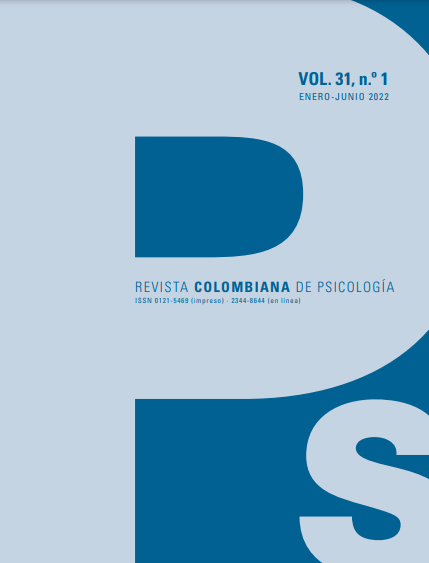Refortalecimiento: Beyond prevention, Empowerment and Intervention in an Impoverish Community in Puerto Rico
Refortalecimiento: Más allá de la prevención, el empoderamiento y la intervención en una comunidad empobrecida en Puerto Rico
DOI:
https://doi.org/10.15446/rcp.v31n1.88726Palabras clave:
community, empowerment, prevention, refortalecimiento, social community psychology (en)comunidad, empoderamiento, prevención, psicología social comunitaria, Refortalecimiento (es)
Descargas
Refortalecimiento is a strategy for transformation that started with a debate with the empowerment theory. We have been clarifying the notion of refortalecimiento from experiences at communities and academic’s scenarios. As a result, we need to re-imagine some of our concepts to address the consequences of inequalities. In this article, we will present some reflections about three concepts: intervention, prevention model, and empowerment theory based in an Intervention-Investigation (I-I) realized in a community with a group of mothers of children with disabilities (diverse abilities) in an impoverish community in Puerto Rico. We confirmed the need to reevaluate the impact of different concepts/perspectives operating within the project that undermine the implementation process. We learned that the beauty of this process resides on the reciprocity and the fortalezas (strengths) that takes place within all the people involved. But we also find out neoliberal values as: individualism, competition, and everyone for themselves presented great obstacles to overcome discrimination and disparities.
How to cite this article: Vázquez-Rivera, C. & Rojas-Livia, J. (2021). Refortalecimiento: Beyond prevention,
empowerment and intervention in an improverish community in Puerto Rico. Revista Colombiana de Psicología, 31 (1), 109-124. https://doi.org/10.15446/rcp.v31n1.88726
Refortalecimiento es una estrategia de transformación que inició como un debate con la teoría del empoderamiento. Hemos continuado clarificando la noción de refortalecimiento desde experiencias en escenarios comunitarios y académicos. Como resultado, se entendió que es necesario re-imaginar algunos de nuestros conceptos para abordar las consecuencias de las desigualdades. En este artículo, presentaremos algunas reflexiones acerca de tres conceptos: intervención, modelo de prevención y la teoría del empoderamiento basado en una Intervención-Investigación (I-I) realizada con un grupo de madres de niños y niñas con impedimentos (habilidades diferentes) en una comunidad empobrecida en Puerto Rico. Se confirmó la necesidad de reevaluar el impacto de los diferentes conceptos/perspectivas operando dentro del proyecto que socaban el proceso de implementación. Aprendimos que la belleza de este proceso reside en la reciprocidad y las fortalezas que tienen lugar en todas las personas involucradas. Pero también identificamos que, valores neoliberales, tales como: individualismo, competencia y cada quien para sí mismo, presentan grandes obstáculos para superar la discriminación y las desigualdades.
Cómo citar este artículo: Vázquez-Rivera, C. & Rojas-Livia, J. (2021). Refortalecimiento: Beyond prevention,
empowerment and intervention in an improverish community in Puerto Rico. Revista Colombiana de Psicología, 31 (1), 109-124. https://doi.org/10.15446/rcp.v31n1.88726
Referencias
Bryan, W. V. (2001). Sociopolitical aspects of disabilities. Springfield, Illinois. Charles C. Thomas Publisher.
Cattaneo, L. B., Calton, J. M., & Brodsky, A. E. (2014). Status quo versus status quake: putting the power back in empowerment. Journal of Community Psychology, 42(4), 433–446. https://doi.org/10.1002/jcop.21619 DOI: https://doi.org/10.1002/jcop.21619
Christens, B. D. (2012). Toward relational empowerment. American Journal of Community Psychology, 50(1–2), 114–128. https://doi.org/10.1007/s10464-011-9483-5 DOI: https://doi.org/10.1007/s10464-011-9483-5
Christens, B. D. (2013). In search of powerful empowerment. Health Education Research, 28(3), 371–374. https://doi.org/10.1093/her/cyt045 DOI: https://doi.org/10.1093/her/cyt045
Díaz Quiñones, A. (1993). La memoria rota. Río Piedras: Ediciones Huracán.
DuBois, D. L. (2017). Prevention and promotion: toward an improve framework for research and action. In M.A. Bond, I. Serrano-García, C.B. Keys, and M. Shinn (Eds.) APA handbook of Community Psychology Vol. I: Theoretical foundations, core concepts, and emerging challenges. (pp. 233-252) Washington, DC: APA. https://doi.org/10.1037/14953-011 DOI: https://doi.org/10.1037/14953-011
Foucault, M. (1999). La hermenéutica del sujeto. Barcelona. Ed. Akal.
Fredericks, B. L. (2008). Which way that empowerment? Aboriginal women’s narratives of empowerment. AlterNative: An International Journal of Indigenous Scholarship, 4(2), 6-19. https://eprints.qut.edu.au/17329/1/17329.pdf DOI: https://doi.org/10.1177/117718010800400202
Freire, P. (1984). La importancia de leer y el proceso de liberación. México: Siglo XXI.
Gergen, K. (2007). Construcción social: Aportes para el debate y la práctica. Universidad de los Andes, Colombia.
González-Rey, F. (2014). Dilemas epistemológicos actuales en psicología comunitaria. En J.M. Flores Osorio (Ed.). Repensar la psicología y lo comunitario en América Latina. (pp. 19-46). México: Universidad de Tijuana.
Gruber, J., & Trickett, E. J. (1987). Can we empower others? The paradox of empowerment in an alternative public high school. American Journal of Community Psychology, 15, 353–372. https://doi.org/10.1007/BF00922703 DOI: https://doi.org/10.1007/BF00922703
Guareschi, P. A. (2008). Introducción. En E. Saforcada & J. Castellá (Eds.) Enfoques conceptuales y técnicos en Psicología Comunitaria. Buenos Aires: Ed. Paidós.
Hage, S. M. & Romano, J. L. (2010). History of prevention and prevention groups: legacy for the 21st century. Groups Dynamics: Theory, Research and Practice, 14(3), 199-210. https://doi.org/10.1037/a0020736 DOI: https://doi.org/10.1037/a0020736
Hur, M. H. (2006). Empowerment in terms of theoretical perspectives: exploring a typology of the process and components across disciplines. Journal of Community Psychology, 34(5), 523–540. https://doi.org/10.1002/jcop.20113 DOI: https://doi.org/10.1002/jcop.20113
Keys, C. B., McConnell, E., Motley, D., Liao, L. & McAuliff, K. (2017). The what, the how, and the who of empowerment: reflections on an intellectual history. In M.A. Bond, I. Serrano-García, C.B. Keys, and M. Shinn (Eds.) APA handbook of Community Psychology Vol. I: Theoretical foundations, core concepts, and emerging challenges. (pp. 213-232) Washington, DC: APA. https://doi.org/10.1037/14953-010 DOI: https://doi.org/10.1037/14953-010
Ladson-Billings, G., & Donner, J. (2005). The moral activist role of critical race theory scholarship. In N.K. Denzin & Y.S. Lincoln (Eds.) The SAGE handbook of qualitative research (3rd ed., pp. 279-302) Thousand Oaks, CA: Sage. https://wmpeople.wm.edu/asset/index/jkdonnor/handbookchapter
Lincoln, Y. S., Lynham, S. A., & Guba, E. G. (2011). Paradigmatic controversies, contradictions, and emerging confluences, revisited. The SAGE handbook of qualitative research (4th ed., pp. 97-128) Thousand Oaks, CA: Sage.
Martín-Baró, I. (1989). Sistema, grupo y poder. Psicología social desde Centroamérica (II). El Salvador. Ed. UCA.
McDonald, K., Raymaker, D., & Gibbons, C. (2017). In M.A. Bond, I. Serrano-García, C.B. Keys, and M. Shinn (Eds.) APA handbook of Community Psychology Vol. I: Theoretical foundations, core concepts, and emerging challenges. (pp. 403-419) Washington, DC: APA. DOI: https://doi.org/10.1037/14953-020
Moreno, M. (2008). Más allá de la intervención. En B. Jiménez-Domínguez (Ed.). Subjetividad, participación e intervención comunitaria. (pp. 85-105). Buenos Aires: Ed. Paidós.
Morrison, S. (2013). Foreign in a domestic sense: American Samoa and the last us nationals. Hastings Constitutional Law Quarterly, 41(1): 71-150. https://static1.squarespace.com/static/591ccf16db29d6afe8606726/t/5933a9e6bebafbc5b6c9c9f8/1496558055352/Morrison_Online.pdf DOI: https://doi.org/10.2139/ssrn.2255231
Nafstad, H. E., Blakar, M. R., Carlquist, E., Phelps, J. M., & Rand-Hendriksen, K. (2009). Globalization, neoliberalism and Community Psychology. American Journal of Community Psychology, 43, 162–175. https://doi.org/10.1007/s10464-008-9216-6 DOI: https://doi.org/10.1007/s10464-008-9216-6
Neal, J. W., & Neal, Z. P. (2010). Power as a structural phenomenon. American Journal of Community Psychology, 48(3-4), 157–167. https://doi.org/10.1007/s10464-010-9356-3 DOI: https://doi.org/10.1007/s10464-010-9356-3
Oliver-Didier, O. (2016). The biopolitics of Thirdspace: urban segregation and resistance in Puerto Rico´s Luis Llorens Torres public housing project. Housing, Theory and Society 33(1) 1-22. https://doi.org/10.1080/14036096.2015.1080757 DOI: https://doi.org/10.1080/14036096.2015.1080757
Pigg, K. E. (2002). Three faces of empowerment: expanding the theory of empowerment in community development. Journal of the Community Development Society, 33(1), 107–123. https://doi.org/10.1080/15575330209490145 DOI: https://doi.org/10.1080/15575330209490145
Preskill, S., & Brookfield, S. D. (2009). Learning as a way of leading: lessons from the struggle for social justice. San Francisco: Jossey-Bass.
Prilleltensky, I. (2008). The role of power in wellness, oppression, and liberation: the promise of psychopolitical validity. American Journal of Community Psychology, 36(2), 116–136. https://doi.org/10.1002/jcop.20225 DOI: https://doi.org/10.1002/jcop.20225
Prilleltensky, I., & Nelson, G. (1997). Community psychology: reclaiming social justice. In D. Fox & I. Prilleltensky (Eds.), Critical psychology: an introduction (pp. 166–184). London: Sage.
Prilleltensky, I., & Nelson, G. (2002). Doing psychology critically: making a difference in diverse settings. New York, NY: Palgrave Macmillan. DOI: https://doi.org/10.1007/978-1-4039-1462-0
PROMESA (2016). The Puerto Rico Oversight, Management, and Economic Stability Act, Public Law 114‐187.
Puerto Rico Housing Authority (1949). Annual report 1948-1949. Colección puertorriqueña. Universidad de Puerto Rico en Río Piedras.
Puerto Rico Public Housing Administration (2014). http://www.avp.pr.gov/residenciales. Puerto Rico Government.
Rappaport, J. (1981). In praise of paradox: a social policy of empowerment over prevention. American Journal of Community Psychology, 9, 1–25. https://doi.org/10.1007/BF00896357 DOI: https://doi.org/10.1007/BF00896357
Rappaport, J. (1987). Terms of empowerment/exemplar of prevention: toward a theory for Community Psychology. American Journal of Community Psychology, 15(2), 121–148. https://doi.org/10.1007/BF00919275 DOI: https://doi.org/10.1007/BF00919275
Reich; S. M., Riemer, M., Prilleltensky, I., & Montero. M. (2007). International community psychology: history and theories. Irvine, CA: Springer. DOI: https://doi.org/10.1007/978-0-387-49500-2
Riger, S. (2017). Feminist and Community Psychology: compelling convergences. In M.A. Bond, I. Serrano-García, C.B. Keys, and M. Shinn (Eds.) APA handbook of Community Psychology Vol. I: theoretical foundations, core concepts, and emerging challenges. (pp. 129-147) Washington, DC: APA. DOI: https://doi.org/10.1037/14953-006
Romano, J. L., & Hage, S. M. (2000). Prevention and counseling psychology: revitalizing commitment for 21st century. The Counseling Psychologist, 28, 733-763. https://doi.org/10.1177/0011000000286001 DOI: https://doi.org/10.1177/0011000000286001
Rushing, S. (2016). What left of ¨empowerment¨ after neoliberalism? Theory & Event, 19(1). https://www.muse.jhu.edu/article/607286
Santos, B. (2006). Renovar la teoría critica y reinventar la emancipación social. Buenos Aires: clacso Libros.
Speer, P. W. (2000). Intrapersonal and interpersonal empowerment: implications for theory. American Journal of Community Psychology, 28(1), 51–61. https://doi.org/10.1002/(SICI)1520-6629(200001)28:1<51::AID-JCOP6>3.0.CO;2-6 DOI: https://doi.org/10.1002/(SICI)1520-6629(200001)28:1<51::AID-JCOP6>3.0.CO;2-6
Staples, L. H. (1990). Powerful ideas about empowerment. Admin Social Work, 14, 29–42. https://doi.org/10.1300/J147v14n02_03 DOI: https://doi.org/10.1300/J147v14n02_03
Starfield, B., Hyde, J., Gérvas, J., & Heath, I. (2008). The concept of prevention: a good idea gone astray? Journal of Epidemiology Community Health, 62, 580-583. http://dx.doi.org/10.1136/jech.2007.071027 DOI: https://doi.org/10.1136/jech.2007.071027
Turró, C., & Krause, M. (2009). Beyond survival: tracing individual empowerment processes in a poor Chilean settlement. Journal of Community Psychology, 37(3), 381–403. https://doi.org/10.1002/jcop.20302 DOI: https://doi.org/10.1002/jcop.20302
Vázquez-Rivera, C. (2004). Refortalecimiento: un debate con el empowerment. Revista Interamericana de Psicología, 38(1), 41-51. https://www.redalyc.org/pdf/284/28438106.pdf
Vázquez-Rivera, C. (2009). Introduction. In C. Vázquez, D. Pérez, M. Figueroa, & W. Pacheco (Eds). International Community Psychology: Shared agendas in diversity. (pp. xxxii-xlv). San Juan, Puerto Rico. Ed: Actividades de Formación Comunitaria.
Vázquez-Rivera, C., Escabí, A., Quiñones, S., & Pacheco, W. (2012). El refortalecimiento como una herramienta de trabajo comunitario: reflexiones desde la comunidad. En A. Zambrano & H. Berroeta (Eds.). Teoría y práctica de la acción comunitaria: Aportes desde la psicología comunitaria. (pp. 257-276). Chile. Ed. Ril.
Vázquez-Rivera, C. (2015). Refortalecimiento y pedagogía de la pregunta: desde un enfoque de aprendizaje cooperativo. En E. J. Huaire, A.M. Elgier, & G. Maldonado (Eds.). Psicología cognitiva y procesos de aprendizaje. (pp. 139-152). Lima: Editorial une-egv.
Vázquez-Rivera, C., Berríos, N., & Escabí, A. (2015). Servicios terapéuticos integrados para niños, niñas y jóvenes con necesidades especiales. Apunt. Cienc. Soc. 05(01), 10-17. https://doi.org/10.18259/acs.2015003. DOI: https://doi.org/10.18259/acs.2015003
Vázquez-Rivera, C. (2016). Más allá de la psicología: Aplicando el enfoque comunitario en cinco niveles de implicación y acción. VIII Congreso Internacional de Psicología celebrado del 13 al 15 de octubre en la Universidad Nacional Mayor de San Marcos. Lima, Perú.
Wallerstein N. (2006). What is the Evidence on effectiveness of empowerment to improve health? Report for the Health Evidence Network (hen). Copenhagen, who. https://www.euro.who.int/__data/assets/pdf_file/0010/74656/E88086.pdf
Woodall, J. R., Warwick-Booth, L., & Cross, R. (2012). Has empowerment lost its power? Health Education Research, 27(4), 742-745. https://doi.org/10.1093/her/cys064 DOI: https://doi.org/10.1093/her/cys064
Zimmerman, M. A. (1990). Taking aim on empowerment research: on the distinction between individual and psychological conceptions. American Journal of Community Psychology, 18(1), 169–177. https://doi.org/10.1007/BF00922695 DOI: https://doi.org/10.1007/BF00922695
Cómo citar
APA
ACM
ACS
ABNT
Chicago
Harvard
IEEE
MLA
Turabian
Vancouver
Descargar cita
CrossRef Cited-by
1. Carlos Vázquez-Rivera, Jacquelinee Rojas-Livia. (2022). Psicología social comunitaria: A medio siglo de una disciplina indisciplinada. Revista Puertorriqueña de Psicologia, 33(1) https://doi.org/10.55611/reps.3301.10.
Dimensions
PlumX
Visitas a la página del resumen del artículo
Descargas
Licencia
Derechos de autor 2022 Revista Colombiana de PsicologíaTodo el contenido de esta revista cuenta con una licencia Creative Commons “Reconocimiento, No comercial y Sin obras derivadas” Internacional 4.0. Sin embargo, si el autor desea obtener el permiso de reproducción, se evaluará cualquier solicitud de su parte.


























